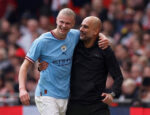Roger Schmidt has been one of the most talked about managers in Europe over the last few years given his spells with Bayer Leverkusen and Red Bull Salzburg. Roger Schmidt tactics coupled with his hyper aggressive style which usually produces goals has entertained fans, with Schmidt being a favourite of the hipster crowd. He had been linked to big jobs across the continent but was recently sacked by Leverkusen following a bad spell. Has he been worked out? Will he still be in line for other jobs this summer? I look at the questions about Roger Schmidt.
Roger Schmidt had a thoroughly unremarkable career as a footballer, mainly at the amateur level. He was a mechanical engineer and would manage Delbrucker SC in the eight tier once he stopped playing. In 2007 he decided to chase his dream of becoming a professional manager and quit his job. He would take over at Preussen Munster, guiding the fifth division side to promotion in his first season. After a couple more impressive seasons, he would join SC Paderborn 06 of the Bundesliga 2. He improved the team by 22 points on the way to fifth. Austrian giants Red Bull Salzburg chose to take a chance on Schmidt. His first season was a disappointment as the reigning champions could only finish second. The following season saw Salzburg dominate the league, setting records as they won the league with eight games to spare and scored 110 goals. Perhaps most impressive was the Europa League campaign which saw them win ten successive games on the way to the quarter finals. Following that stupendous season, Leverkusen moved in. At Leverkusen, Schmidt created one of the most exciting teams in Europe. However this season, with Leverkusen sitting in tenth and likely to exit Europe, the club chose to sack Schmidt following a 6-2 defeat to Dortmund this season.
At no point in his managerial career has Schmidt been adverse to high scoring games. He plays a style of football so different to anyone else that it has to be compared to another sport. The Phoenix Suns(Basketball) ‘seven seconds or less’ teams led by Mike D’Antoni are revered as revolutionaries despite never winning a title. The idea was to attack very quickly and shoot the ball within seven seconds after gaining control. Schmidt also looks to win the ball aggressively and quickly create chances against a defence which is unlikely to be set up. Similar to Jurgen Klopp, Schmidt is a big believer of the gegenpress. They use a base formation of 4-2-2-2 on paper. The two central midfielders sit deep protecting the back four while the front four are often quite narrow. His teams set lots of traps and covet horizontal compactness which pushes teams out onto the flanks. The touchline press is where Schmidt encourages his team to really press as the player only has a 180 degree where he can play.
He tries to isolate two opposition players with three of his own and if they win the ball back they look to transition at lightning speeds. They look to overwhelm teams by offering multiple passing options all getting forward. Schmidt teams want to get a shot off before a defence can get set which means that they take a lot of long shots. At Leverkusen he made sure the players who were in his front four were mobile, energetic and had differing abilities but always the ability to score from long range. His principles have led to some high scoring games, including when Salzburg beat Ajax 6-1 on aggregate in the Europa League.
So what went wrong for Schmidt? One issue which he created for himself was that success breeds expectation. Leverkusen were thought to be able to challenge Bayern Munich this season and definitely be part of a big three with Borussia Dortmund. Bielsa, another manager with a fierce press famously tended to wear his sides out towards the end of season. Schmidt would see his team tire in a different way. They would often tire late in games and would always have a lull in the season. It would not necessarily be at the end of the season but they would always go through a patchy spell. Perhaps the biggest issue for Schmidt was his reluctance to change. This could be seen with defeats in his final month to Atletico Madrid and Borussia Dortmund which both seemed to go the same way as initial lines of resistance were easily punctured. Teams that were quick and incisive could isolate the centre backs. This was part of the reason that they concede a lot of good shots. They have also conceded a large amount of goals from set pieces. Rudi Voller spoke of his commitment to his philosophy by saying “he is convinced of his concept and can get a bit angry if somebody questions it.” On the sidelines he is aloof and cantankerous. Watching his sides play can also be a weird experience. It is a different type of football which often seems like just watching lots of chasing while odder tactics include giving the ball away in certain areas. When it is going well you can ignore all the negatives, when the results go the wrong way you start to feel he is just not worth the trouble.
Schmidt has been mentioned quite prominently for many jobs over the last few years including the Arsenal one. He was also recently mentioned in connection with the Leicester job. The Premier League seems to have not had as much tactical variation as other big European leagues and Schmidt would be an intriguing hire. It would be a more agresssive version of Jurgen Klopp who has been lauded since his arrival in England. I would be surprised if a German team hired him as he currently has a bit of a bad reputation in Germany. The one factor that could see him return is if RB Leizpig watch Ralph Hasenhuttl leave this summer. Given his links with Red Bull teams, he could be a name to watch. Otherwise you wonder if a bigger club in a smaller nation would see his success at Salzburg and hope he could replicate it for them.
So in no way is the style of Roger Schmidt perfect. Schmidt seems to be the type of manager who looks wonderful when it is going right but when it starts to go wrong, you can see every flaw. His major issue is the reluctance to adapt from his philosophy, which he is very passionate about. The failure may humble Schmidt and enable him to come back better with a system that he can change when necessary. I imagine he will look to explore jobs in the other top European leagues and expect him to experience some success.









Recent Comments